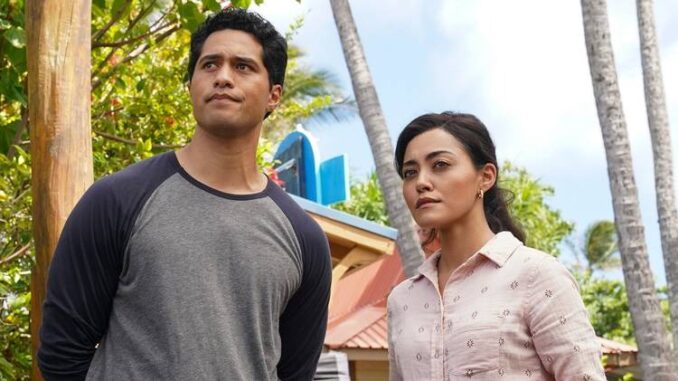
“Incognito” hones in on Lala Dominguez (Mariel Molino), the muse of Gibbs’ NCIS: Origins story. In his narration as older Gibbs, Mark Harmon discusses how she felt like she was in a box, with episode 6 exploring how Lala struggles to excel as a woman on Mike Franks’ NIS team. The previous episode highlighted how the leader overlooked Vera Strickland (Diany Rodriguez) despite previously working together. After being called out, Mike eventually helps his former partner with the endeavor. Sadly, him successfully garnering funding after Vera failed further highlights women’s unique challenges at NIS.
The developing tension between Mike Franks and the women he works with is no surprise, considering the character’s introduction to the NCIS franchise. Gibbs’ mentor first appeared in NCIS season 3, episode 24, “Hiatus Part II,” one of the best episodes of NCIS. NCIS Director Jenny Shepard (Lauren Holly) called Franks to help restore Gibbs’ memory, and he was necessarily rude. When he learns that Jenny is the director, he comments negatively in disbelief regarding her gender. Thus, NCIS revealed decades ago that Franks was sexist. As NCIS: Origins grapples with that, it exposes an existing issue within the franchise.
NCIS: Origins Shows How Important Jane Tennant’s Story Is In NCIS: Hawai’i
Lala’s Struggle Highlights The Need For NCIS: Hawai’i. Honing in on how women have been underrepresented in NCIS, NCIS: Origins exacerbates the demand for a strong female lead like Jane Tennant. Lachey’s character was the first female to lead an NCIS show, and she lost the spotlight when NCIS: Origins came on the scene. Lachey was also the first Asian American to lead an installment in the franchise. She brought her intersectional experience to her character, which deeply enriched the series. As a diverse character, Jane Tennant’s unfinished storylines make NCIS: Hawai’i’s cancelation even worse. Now, her cliffhanger narrative will likely never be resolved.
Lachey’s character was just one aspect of what NCIS: Hawai’i offered, which set it apart from other series in the franchise. The Island-based spinoff also featured rich experiences within the LGBTQ+ community, prominently featuring an intimate, loving relationship between two female NCIS agents. The romance between Lucy Tara (Yasmine Al-Bustami) and Kate Whistler (Tori Anderson) enhanced the rich diversity that NCIS: Hawai’i brought. The new NCIS: Origins spinoff underlines the need for more female representation, such as women in positions of power like Jane Tennant, exacerbating the loss of NCIS: Hawai’i.
A Bold Episode That Pulls No Punches
“NCIS: Origins” Episode 6 drops the niceties and dives headfirst into one of the toughest battles women face — thriving in a male-dominated profession. Lala Dominguez, a rising agent in Mike Franks’ gritty NCIS squad, takes center stage this week. But it’s not just about investigations and interrogations — it’s about her personal war to be taken seriously in a team where testosterone often talks louder than talent. Let’s break down what makes this episode not just a great watch, but a critical conversation starter.
Breaking Through the Noise: Lala’s Spotlight Moment
From Background Player to Frontline Hero
Lala Dominguez has hovered in the background for much of the season — sharp, capable, but often sidelined. Episode 6 flips the script. She’s thrust into a case that not only challenges her skill set but exposes the bias simmering beneath the surface of the team dynamics.
Not Just Another Rookie
Yes, she’s new. Yes, she’s learning. But make no mistake — Lala’s instincts are razor-sharp. What this episode does beautifully is show us she’s not just a token female character tossed into the mix. She’s here to lead, learn, and fight.
The Mental Load of Proving Yourself
When Competence Isn’t Enough
Ever had to prove yourself over and over just to get a seat at the table? That’s Lala’s daily reality. And it’s exhausting. Her work ethic? Impeccable. Her dedication? Unquestionable. But in a team run by the rough-and-ready Mike Franks, where bravado often overshadows brilliance, she’s constantly pushed to the sidelines.
The Emotional Toll of Masculine Work Culture
This episode isn’t just about solving a crime — it’s about the emotional labor that comes with trying to succeed in a team that doesn’t quite see you. It’s about being talked over, second-guessed, and underestimated. And yeah, it stings.
Mike Franks’ Old-School Leadership Style Gets Challenged
Respect Is Earned… But At What Cost?
Mike Franks is legendary — and tough. But his “sink or swim” approach doesn’t work the same for everyone. For Lala, it feels like being tossed into shark-infested waters without a life jacket. Episode 6 makes it clear: the pressure cooker environment isn’t just about testing skills, it’s about testing limits.
A Leadership Reckoning?
For the first time, we see Mike begin to question if his way of doing things might be part of the problem. Could this be the beginning of a softer, more inclusive leadership arc? We’ll have to wait and see.
Case of the Week: A Metaphor in Disguise
The Plot Mirrors the Pain
The actual NCIS case — tracking a rogue marine suspected of espionage — serves as a clever metaphor. Like Lala, this marine is dismissed and misunderstood, forced to operate from the shadows. The parallels aren’t subtle — and that’s exactly why they work.
Solving the Case = Solving Herself
As Lala connects dots others miss, she earns a crucial win. But more importantly, she begins to trust herself in the face of constant doubt. It’s not just about solving a mystery — it’s about reclaiming her space.
Representation That Matters
Female Audiences Are Finally Being Seen
Let’s be real — women in procedural dramas are too often sidekicks, victims, or emotional anchors. Episode 6 changes that. It gives Lala the space to be a leader, a learner, and a layered human being.
Latinx Women in Law Enforcement on Screen
Lala isn’t just a woman. She’s a Latinx woman in a system not built for her. That matters. Her presence challenges stereotypes and opens doors for more diverse storytelling in the NCIS universe.
Tension, Growth, and Real Progress
Conflict That Feels Real
The tension between Lala and her team isn’t melodrama — it’s reality. It’s workplace friction that women know all too well. The silent stares. The subtle digs. The moments when your voice doesn’t land.
Allies Begin to Emerge
There are glimmers of hope. A fellow agent steps up. A word of encouragement lands. The cold walls begin to thaw — and while it’s not a revolution, it’s a start.
Standout Scenes Worth Rewatching
The Confrontation With Mike
Mid-episode, Lala finally snaps. She calls out the double standards. And Franks? He listens. That moment crackles with authenticity — it’s not polished, it’s raw. And it feels like change.
The Final Briefing Scene
When Lala steps up to lead the final briefing, her teammates are stunned — not because she’s good, but because she’s that good. No more underestimating her.
What This Episode Gets Right About Gender Bias
It Doesn’t Preach — It Shows
One of the smartest moves this episode makes is showing bias through action, not speeches. We feel Lala’s struggle through quiet moments and microaggressions, not monologues.
Complexity Over Stereotypes
Lala is flawed, scared, strong, sharp, and vulnerable. She isn’t a “perfect” woman. She’s real. And that’s exactly why she resonates.

What It Means for NCIS: Origins Going Forward
A Turning Point in Character Arcs
This episode is a pivot point — not just for Lala, but for the entire team. It shows that character development doesn’t just mean solving backstories — it means emotional evolution.
Setting the Stage for More Diversity
If the writers continue down this road, we could see NCIS: Origins become one of the most inclusive, nuanced entries in the franchise. Fingers crossed.
Conclusion: Lala’s Fight Is Bigger Than Just One Episode
Episode 6 of NCIS: Origins doesn’t just tell a story — it makes a statement. Lala’s journey to be respected, heard, and valued echoes the experience of countless women across workplaces, especially in fields like law enforcement. Her resilience isn’t just inspiring — it’s a reminder that strength isn’t always loud, and leadership isn’t always about yelling the loudest.
In a franchise built on grit, Lala brings a different kind of toughness — the kind forged in silence, in setbacks, and in quiet wins. And in this episode, she finally takes up space. And we’re here for it.